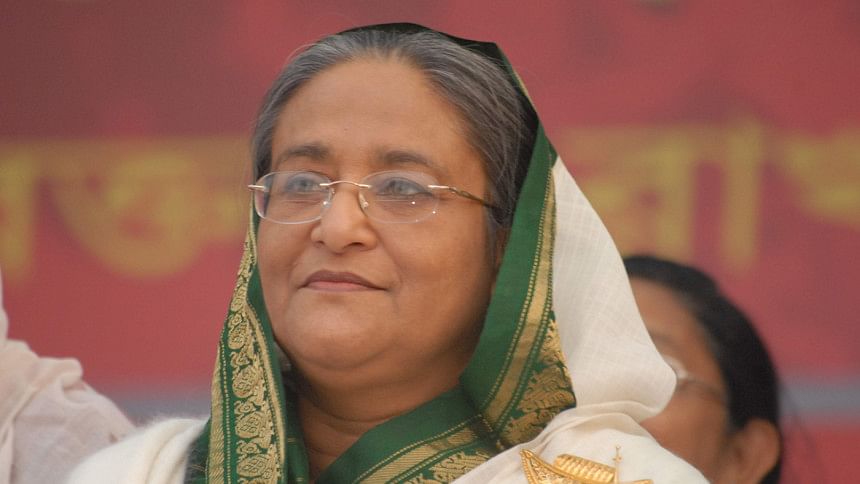BNP rode on India, US to win in 2001

Taking a swipe at BNP for its recent anti-Indian remarks, Prime Minister Sheikh Hasina yesterday alleged that the party came to power in 2001 through giving an undertaking to sell gas to India.
“Today I hear them [BNP leaders] making anti-Indian remarks.... When the US company wanted to sell gas to India just before the national election in 2001, Khaleda Zia took BNP to power through giving an undertaking of selling gas. But I didn't give any undertaking as I wanted to utilise the country's resources for people's welfare,” she said.
The then agent of RAW and officials of the US embassy also passed time at “Hawa Bhaban” before the 2001 parliamentary election so that the Awami League could be defeated and BNP grab power and thus sell gas, Hasina added.
The PM was addressing the National Council of Bangladesh Jubo Mohila League, a youth women front of the ruling AL, at Krishibid Institution, Bangladesh.
She said then PM Khaleda Zia toured India after assuming power in 1991, but when journalists on her return home asked her about the Ganges water sharing issue, the BNP chief told reporters that she forgot to raise it.
Khaleda, the premier said, made many anti-Indian remarks, joined a long march towards the Farakka barrage and also waged a movement for Ganges water sharing treaty. “How could she forget such an important issue?”
About the elections under the previous BNP governments, Hasina said the party doesn't have any history of holding credible polls. “It has histories of vote rigging, printing additional ballot papers, stuffing ballot boxes, creating terrorism and militancy, snatching vote results and selling the country's resources to others.” she alleged.
“If we see their election history, including 'yes-no' votes, presidential election in 1978, parliamentary polls in 1979, another presidential polls in 1981, Magura and Mirpur by-polls and national election on February 15, 1996, there is no free, fair and credible election.”
Referring to BNP's allegation that the government was not allowing it to take to the streets, Hasina questioned, “How'll they do politics if they are scared so much about taking to the streets?”
She also urged people, including the leaders and workers of Jubo Mohila League, to work together to further advance the country with the spirit of the Liberation War and to publicise the government's steps towards women empowerment and women development.
Describing the history of forming Jubo Mohila League on July 6, 2002, the PM said the aim of establishing the organisation was to create female leadership and empower women.
Bangladesh Awami League Women and Children Affairs Secretary Fazilatunnesa Indira, Jubo Mohila League Senior Vice President Zakia Parvin Moni, General Secretary Apu Ukil and Organising Secretary Ishrat Jahan Nasrin spoke at the programme, chaired by its President Nazma Akhter.
Earlier, the PM formally inaugurated the National Council by hoisting the national flag and releasing white pigeons.
A one-minute silence was observed in memory of those Jubo Mohila League leaders and workers who laid down their lives in various struggles and democratic movements.
The premier also witnessed a dance performance.
Awami League General Secretary and Road Transport and Bridges Minister Obaidul Quader was present.
NAZMA, APU RE-ELECTED
Nazma Akhtar and Apu Ukil were re-elected president and general secretary of Jubo Mohila League. Obaidul Quader announced their names, reports The Daily Star correspondent.
The names of presidents and general secretaries of the organisation's Dhaka city (North and South) units were also declared.
Sabina Akhtar Tuhin and Tahera Khatun Lutfa were elected president and general secretary of Dhaka City (North) unit while Farida Yasmin Jhuma and Nilufar Yasmin were elected to the same posts of Dhaka City (South) unit.
Jubo Mohila League held its first council on March 5, 2004, electing Nazma and Apu to the two top posts.

 For all latest news, follow The Daily Star's Google News channel.
For all latest news, follow The Daily Star's Google News channel. 



Comments